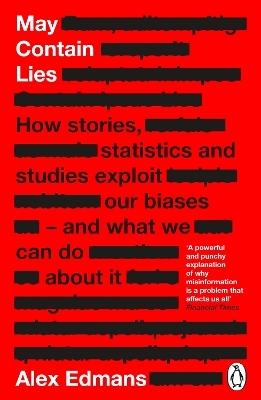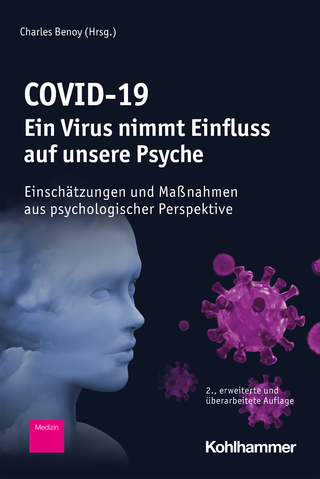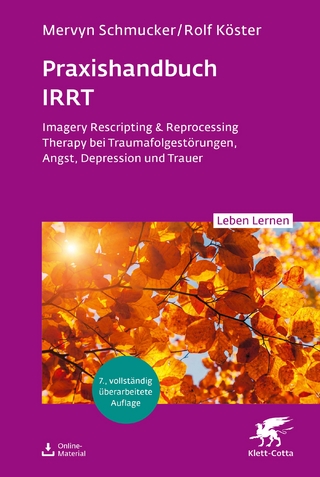
May Contain Lies
How Stories, Statistics and Studies Exploit Our Biases - And What We Can Do About It
Seiten
2025
Penguin Books Ltd (Verlag)
978-0-241-63018-1 (ISBN)
Penguin Books Ltd (Verlag)
978-0-241-63018-1 (ISBN)
- Noch nicht erschienen (ca. April 2025)
- Versandkostenfrei innerhalb Deutschlands
- Auch auf Rechnung
- Verfügbarkeit in der Filiale vor Ort prüfen
- Artikel merken
'Alex Edmans is such a crisp, sharp salutary voice – and a great guide to the bullsh*t of the modern world' Rory Stewart
'A powerful and punchy explanation of why misinformation is a problem that affects us all' Gillian Tett, Financial Times
A ground-breaking book that reveals why our human biases affect the way we receive and interpret information, with practical suggestions for how to think more critically
Our lives are minefields of misinformation. Stories, statistics and studies are everywhere, allowing people to find evidence to support whatever position they want. Many of these sources are flawed, yet by playing on our emotions and preying on our biases, they can gain widespread acceptance and warp our views.
In this eye-opening book, economist and professor Alex Edmans teaches us how to separate fact from fiction. Using colourful examples – from a wellness guru’s tragic but fabricated backstory, to the blunders that led to the Deepwater Horizon disaster – Edmans highlights the biases that cause us to mistake statements for facts, facts for data, data for evidence, and evidence for proof.
May Contain Lies is an essential read for anyone who wants to make better sense of the world and make clear-eyed decisions.
'A passionate and dispassionate call to truth – and how to achieve it’ Will Hutton, Guardian
'A timely book and, despite the nerdy statistical theories, is often quite funny' Harry Wallop, The Times
'A powerful and punchy explanation of why misinformation is a problem that affects us all' Gillian Tett, Financial Times
A ground-breaking book that reveals why our human biases affect the way we receive and interpret information, with practical suggestions for how to think more critically
Our lives are minefields of misinformation. Stories, statistics and studies are everywhere, allowing people to find evidence to support whatever position they want. Many of these sources are flawed, yet by playing on our emotions and preying on our biases, they can gain widespread acceptance and warp our views.
In this eye-opening book, economist and professor Alex Edmans teaches us how to separate fact from fiction. Using colourful examples – from a wellness guru’s tragic but fabricated backstory, to the blunders that led to the Deepwater Horizon disaster – Edmans highlights the biases that cause us to mistake statements for facts, facts for data, data for evidence, and evidence for proof.
May Contain Lies is an essential read for anyone who wants to make better sense of the world and make clear-eyed decisions.
'A passionate and dispassionate call to truth – and how to achieve it’ Will Hutton, Guardian
'A timely book and, despite the nerdy statistical theories, is often quite funny' Harry Wallop, The Times
Alex Edmans is Professor of Finance at London Business School. His TED talk 'What to Trust in a Post-Truth World' has been viewed 2 million times. He has also spoken at Davos and Google. In 2013, he was awarded tenure at The Wharton School and in 2021, was named MBA Professor of the Year by Poets and Quants. Edmans writes regularly for the Wall Street Journal, Financial Times and Harvard Business Review. His first book Grow the Pie (Cambridge University Press) was a Financial Times Book of the Year.
| Erscheint lt. Verlag | 17.4.2025 |
|---|---|
| Verlagsort | London |
| Sprache | englisch |
| Maße | 129 x 198 mm |
| Gewicht | 500 g |
| Themenwelt | Sachbuch/Ratgeber ► Gesundheit / Leben / Psychologie ► Psychologie |
| Sozialwissenschaften ► Kommunikation / Medien ► Medienwissenschaft | |
| ISBN-10 | 0-241-63018-5 / 0241630185 |
| ISBN-13 | 978-0-241-63018-1 / 9780241630181 |
| Zustand | Neuware |
| Informationen gemäß Produktsicherheitsverordnung (GPSR) | |
| Haben Sie eine Frage zum Produkt? |
Mehr entdecken
aus dem Bereich
aus dem Bereich
Buch | Softcover (2021)
Kohlhammer (Verlag)
29,00 €
Grundlagen, Übungen, Anwendungen
Buch | Softcover (2023)
Klett-Cotta (Verlag)
23,00 €
imagery rescripting & reprocessing therapy bei Traumafolgestörungen, …
Buch | Softcover (2025)
Klett-Cotta (Verlag)
55,00 €


